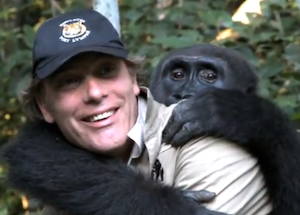
Damian Aspinall, returns to the bush to see a gorilla that he took to the wild 5 years earlier. In an emotional video, the gorilla demonstrates genuine recognition, affection and join-up. Angus McLeod’s learning from this inspiring video is below..
To receive email links to similar pages of free information, sign up now:
[magicactionbox id=”5129″]
How do you authentically own a (coaching) mindset that allows others to trust you? We see how a gorilla carries a memory of trust over a five year period, how he matures and recalls that trust; how the gorilla acts proactively to make contact while James exhibits behaviours that are non-threatening… how non-threatening creates deep trust and even affection.
When we mark out the leader and coach qualities that single out the best leaders & coaches from others, we might think to add some of the traits (in both the gorilla & Damian) to our own sense of identity? Traits might include, trust and acceptance, affection, open-handed, relaxed and inquisitive. Which words did I miss? We can allow these chosen traits to instil a genuine sense of identity. When we do that, surely the mindset then modifies, naturally, the way we communicate with our stakeholders & colleagues in our behaviours at the macro and at the micro level?
Damian was non-threatening – we might consider to what extent we get in the way of pure, facilitative ‘presence’ alongside colleagues and coachees? It may not be any level of ‘threatening’ that is our issue, but we could have other issues that interfere with the dynamic space between two people – that reduce the capacity for growth, energy and success (examples below).
To correct any of these issues from polluting the purity of our relating, we may want to let go of ‘personal needs’ in our relating? For example, our needs to be seen as ‘professional’, authoritative, impressive or anything else that negatively affects our behaviours, whether observable or sensed…
The real impact we can have as leaders (and as coaches) is to be human.
To be human and a leader is to have genuine interest and regard for the ‘other’ and to set aside our ‘self’ for the greater good.
If we are to fully live and breathe the privilege of managing others; to embody the role of facilitator or coach, then a humanistic mindset may be a better place to start, and thus avoid polluting relationships we have and will have.
The power of the ‘self-less’ self is compelling, attractive, masterful – and all without the need of self-promotion. The fact of being a facilitating human is itself the most powerful trait any leader or coach can aspire to isn’t it?
Angus McLeod
2014.